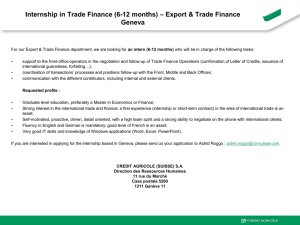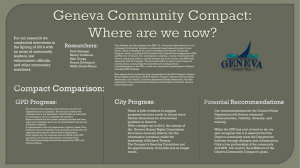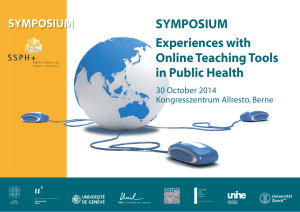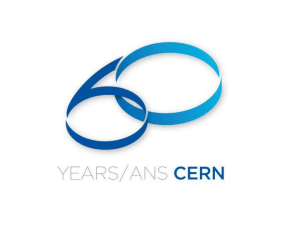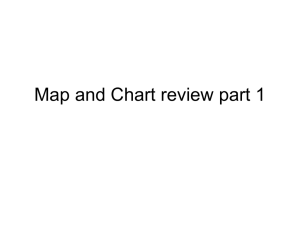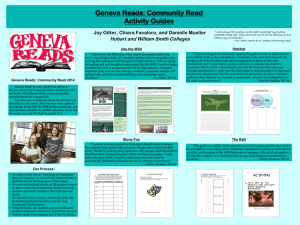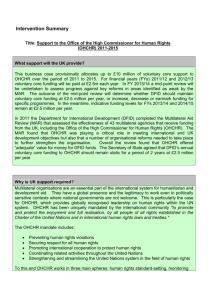Ms. Thuy Huong Ha
advertisement
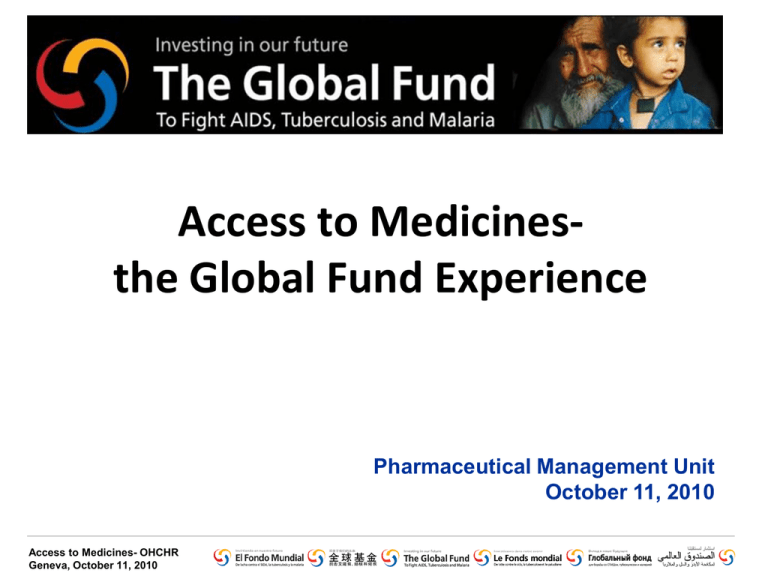
Access to Medicinesthe Global Fund Experience Pharmaceutical Management Unit October 11, 2010 Access to Medicines- OHCHR Geneva, October 11, 2010 Presentations Outline 1) Introduction to Global Fund 2) Existing Challenges-Global Fund’s Approach Sustainable Financing; Procurement and Supply Chain Management; Quality Assured Medicines; Availability and Affordability; Capacity Building and Technical Assistance; Health System Strengthening; Harmonization; 3) Human Rights Principles- Global Fund’s Approach 4) Emerging Issues and Way Forward; Access to Medicines- OHCHR Geneva, October 11, 2010 Introduction: The Global Fund • To raise and disburse substantial new funds to achieve sustained impact to fight HIV, TB and Malaria; • Financing mechanism but not an implementing or technical agency; • Partnership between governments, civil society, the private sector and affected communities; • Performance based funding and Country ownership; • Proposals are submitted by Country Coordinating Mechanism (CCM); Access to Medicines- OHCHR Geneva, October 11, 2010 Introduction: Approved Proposals- by Disease 100% = US$ 19.4 billion Access to Medicines- OHCHR Geneva, October 11, 2010 OP/140709/2 Introduction: Approved Proposal- by Regions Middle East & North Affrica 6% East Asia & Pacific 14% Eastern Europe & Central Asia 7% Sub-Saharan Africa 57% Latin America & the Caribbean 7% South Asia 9% Round 9 Access to Medicines- OHCHR Geneva, October 11, 2010 Introduction: Global Fund’s Contribution to Int’l Health Financing HIV- 19%; TB- 64%; Malaria- 57%; Access to Medicines- OHCHR Geneva, October 11, 2010 Introduction: Rapid Scaling Up of Results Access to Medicines- OHCHR Geneva, October 11, 2010 Existing Challenges: Sustainable Financing • Global Fund outlined funding scenarios of between US$13 billion and US$20 billion needed for the next three years; • Donor funding is being difficult due to: – Global financial crisis, – Severe restrictions in ODA; – Competing priorities; – Budgeting challenges in donor countries; • Global Fund is pursuing various innovative financing options: – Product Red, Debt 2 Health, Exchange Fund, UNITAID, American Idol, Chevron, etc., Access to Medicines- OHCHR Geneva, October 11, 2010 Existing Challenges: Procurement and Supply Management (PSM) Global Fund PSM Policy based on principle and minimum standards rather detailed procedures. • Quality-assured products; • Lowest possible price; • Transparent, fair and competitive procurement; • National laws and international agreements; • Build on existing systems; • Recipients responsible for all PSM activities; • Value for Money; Access to Medicines- OHCHR Geneva, October 11, 2010 Existing Challenges: Quality Assured Medicines Global Fund Quality Assurance Policy ensures quality assured medicines: – Option A: WHO prequalification approval; – Option B: Stringent Regulatory Authority (SRA) approval; – Option ERP: Premitted for time-limited procurement upon risk/benefit assessment (of FPPs not yet WHO-PQ or SRA-authorized) by an Expert Review Panel (ERP) hosted by WHO; • QC Testing: PR is responsible to conduct systematic random QC testing all along the supply chain and report to the Global Fund. Access to Medicines- OHCHR Geneva, October 11, 2010 Existing Challenges: Availability and Affordability • List of ARV, TB and Malaria- An overview (not exhaustive) of products and manufacturers classified according to the Global Fund Quality Assurance Policy to assist countries to identify and select quality assured medicines; Products/Manufacturers distribution: ARV: Malaria Branded-34% Generic-66% Branded-70% Generic-30% Access to Medicines- OHCHR Geneva, October 11, 2010 TB Branded-22% Generic-78% Existing Challenges: Availability and Affordability Price difference-Generic vs Originator Access to Medicines- OHCHR Geneva, October 11, 2010 Existing Challenges: Availability and Affordability Price Difference Across Countries • Global Fund encourages recipients to apply the flexibilities within national laws and TRIPS agreement (Doha Declarations), in a manner that achieves the lowest possible price for assured quality products; • Wide spectrum of countries among grantees: Unequal access to differential price programs of pharmaceutical companies; Different level of patent protection/ TRIPS implementation; Bilateral and regional trade agreements; Unequal level of knowledge in IP; Access to Medicines- OHCHR Geneva, October 11, 2010 Existing Challenges: Capacity Building & Technical Assistance • Assistance with Procurement Supply Management (PSM) Plan during grant life cycle; • Facilitating access to TA and capacity building services for strengthening supply/pharmaceutical national systems in recipient countries in partnerships with technical agencies and partners; • Examples: • • • Pharmaceutical Management Advisory Services (PMAS) • Country Profile/ PSM Plan Assessment Procurement Support Services (PSS) Pharmacovigilance / Pharmacoresistance • Monitoring of quality services, strengthening NDRA Access to Medicines- OHCHR Geneva, October 11, 2010 Existing Challenges: Health System Strengthening • Dedicated Health System Strengthening grants; • 6% funding budget is used on Health System Strengthening activities in all grants: Human resources ● Strategic information •Infrastructure ● Enabling policy environment • Health financing ● Community Systems Strengthening; • Work in progress with GAVI and World Bank of various options for joint HSS funding and programming; Access to Medicines- OHCHR Geneva, October 11, 2010 Existing Challenges: Health System Strengthening Use of the Global Fund Grant Funding 37% percent funds are used for medicines and health product procurement; Access to Medicines- OHCHR Geneva, October 11, 2010 Existing Challenges: Harmonization • Quality Assurance Policy with other partners-UNITAID, GDF, etc., • PSM Country Profile - Comprehensive and simplified PSM for one country rather per grant/disease; • National Strategy Application (NSA)-69 countries approved; • New Grant Architecture: - Improved alignment (consolidation/single stream of funding to align with national cycle and system); - Decreased transaction costs for implementers and Secretariat( reduction in reporting and disbursement requests); • Joint HSS Platform with Partners; Access to Medicines- OHCHR Geneva, October 11, 2010 HR Principles: Equity, Non Discrimination, & Participation Framework document of the Global Fund states that: • Equitable access to services; • Eliminate stigmatization and discrimination against those infected and affected, especially for women, children and vulnerable groups; • Strengthen participation by communities, infected and affected people; • Gender Equality and SOGI strategies- 87% of R9 HIV funded proposals included SOGI focus; • Representation in CCM also increased in R8/ R9; Access to Medicines- OHCHR Geneva, October 11, 2010 HR Principles: Transparency and Accountability • Price and Quality Reporting (PQR): Web based system for tracking the pharmaceutical procurement; • Reporting is mandatory- data and reports are publicly available; • Grant related information ( proposal, budget, disbursement, etc.,), donor pledges and contributions are available on web; • QA Compliance Report/Phase 2 Review: monitor noncompliance of drug procurement by countries; • Corrective measures for non compliance including no disbursement, Conditions Precedents, leading up to grant closure; Access to Medicines- OHCHR Geneva, October 11, 2010 Emerging Issues • Scarcity of Quality Assured products-e.g., malaria; • Increasing difficulties expected for countries: – on the implementation of treatment guidelines, including newer medicines, if these are not accessible at lower prices; – to deal with patent issues, as new recommended ARV are widely patented; • Many countries are focused on short term rather long term solution- e.g, health system; Access to Medicines- OHCHR Geneva, October 11, 2010 Way Forward • Need sustainable solutions: • to strengthen the PSM capacity and health system; • to ensure production of lower priced generics and in adequate formulations; • to simply the IP management by importing countries; • to ensure countries taking full advantage of the TRIPS flexibilities; • to provide incentives for new drugs in the market; • Continued monitoring and evaluation of access to medicines; • Greater cooperation/harmonization with donors and partners; • Strong leadership and advocacy toward access to medicines; Access to Medicines- OHCHR Geneva, October 11, 2010 THANK YOU! MERCI! SHOKRAN! SPASIBA! Access to Medicines- OHCHR Geneva, October 11, 2010 XIE XIE!
